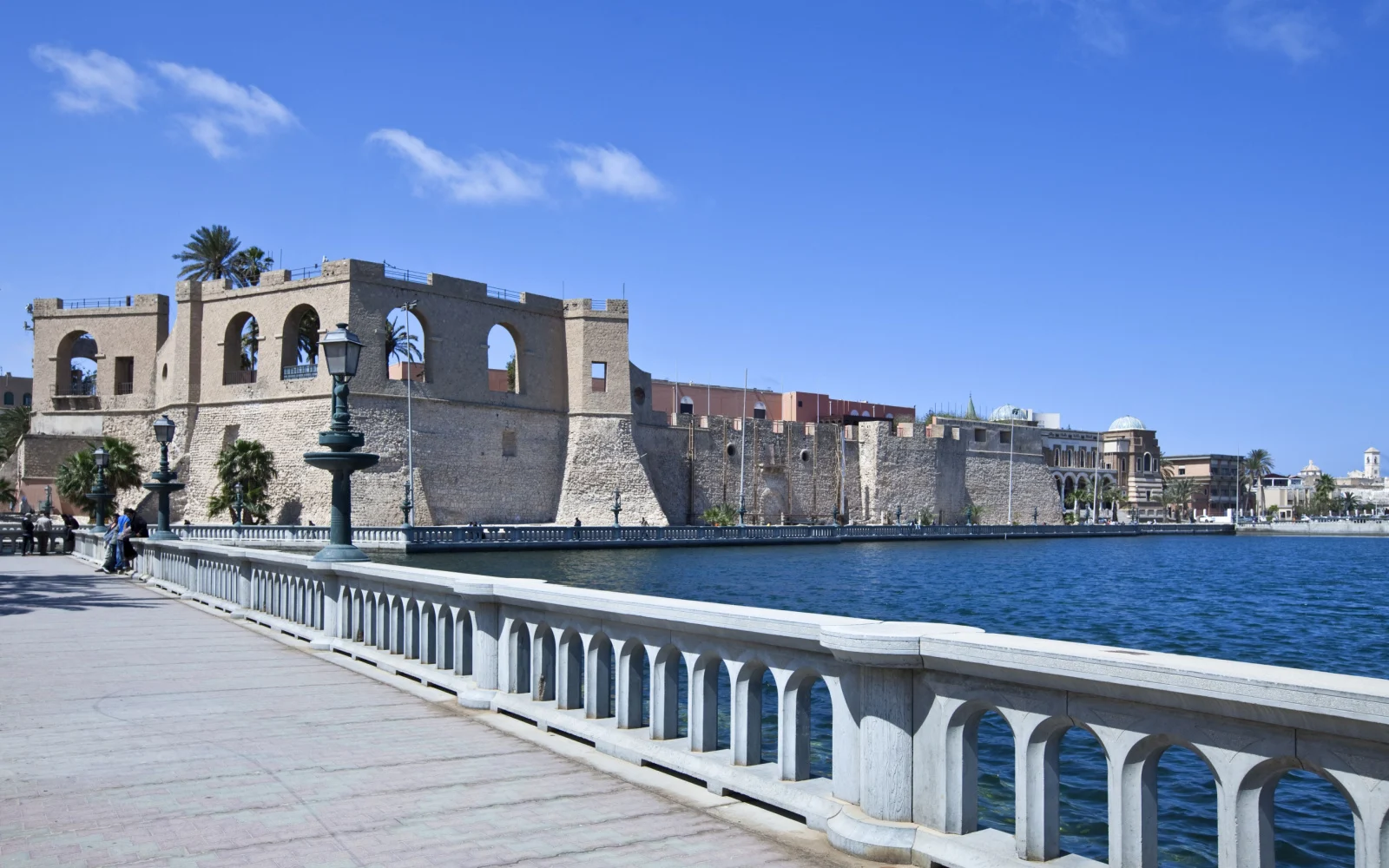Is Libya safe to visit in 2025?
Libya is currently not safe for tourists due to ongoing armed conflict, a power vacuum, high levels of crime including kidnapping, and the presence of terrorist groups. Foreigners are at risk, and most governments advise against travel to Libya.
Libya is a mysterious country in North Africa. While fellow countries in the region Morocco and Egypt are hot spots for international tourism, Libya is still relatively undiscovered.
Visitors that do come to Libya get to explore amazing Roman ruins such as Leptis Magna, one of the most important cities in Carthage and in Roman Libya that is still well-preserved today. But while this country is rich in both history and culture, is Libya safe to visit? Here’s our expert opinion.
Is Libya Safe to Visit in 2025?
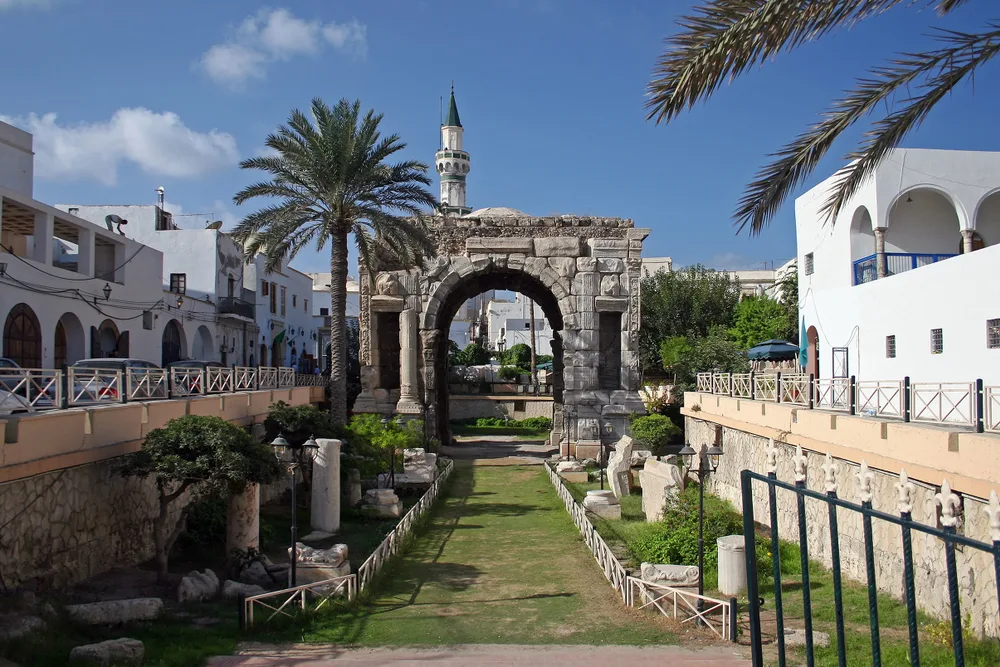
Norman Krauss/Shutterstock
No, Libya is not safe to visit for tourists due to the ongoing armed conflict. After the death of long-term dictator Muammar Gaddafi in 2011, the country descended into anarchy and is now considered a failed state.
This power vacuum makes it easy for terrorist groups, armed militias, and criminals to flourish. To understand why Libya is unsafe to visit now, even though it used to be a tourist destination just a few decades ago, it’s important to understand the country’s recent history.
For decades, the country was ruled by Colonel Muammar Gaddafi, a secular dictator. Gaddafi was killed in 2011 as part of the region-wide Arab Spring and a transitional government quickly called elections.
However, hope and peace in Libya was short-lived. The new government was unable to control all of Libya’s territory, which allowed terrorist groups and armed militias to flourish.
In 2014, the situation escalated into full-blown civil war and the country was divided into two major rival coalitions controlling the east and west along with several smaller factions.
There have been attempts by the UN and other international actors to broker ceasefires and hold elections, but nothing has been enough to end the ongoing political crisis.
Experts don’t see an end to the instability, as long as different geopolitical actors are acting out their interests through Libya, vying factions can’t agree on sharing power, and there is still a power vacuum.
Even though the fighting is not as fierce as it was during the worst of the war, there are still regular clashes, demonstrations that turn violent, and terrorist attacks that happen without warning.
Due to this extremely volatile security situation, most governments tell their citizens to avoid all travel to Libya. For example, the Irish government tells all citizens not to travel to Libya due to the threat of ongoing fighting as well as terrorism and kidnapping.
Most governments, including the Irish one, warn citizens that if they do travel to Libya, they cannot expect assistance because most countries have closed their diplomatic missions in Libya out of concern for the safety of their diplomats.
The lack of a diplomatic mission to help you in case of a bad situation should concern you since Libyan laws are strict and there is a history of their enforcement against foreign citizens.
For example, in April 2023, two American citizens were arrested for allegedly proselytizing Christianity, and although the US government is doing its best to help them, its hands are tied by the lack of a diplomatic mission.
To recap, if you go to Libya, you will need to worry about:
- Armed conflict
- Lack of legal protection as well as strict law enforcement
- Violent protests
- Terrorism
- Kidnapping
- Banditry
The risk to life and safety is simply too high to safely go to Libya now, although some travelers interested in “dark tourism” still make their way there.
Crime in Libya
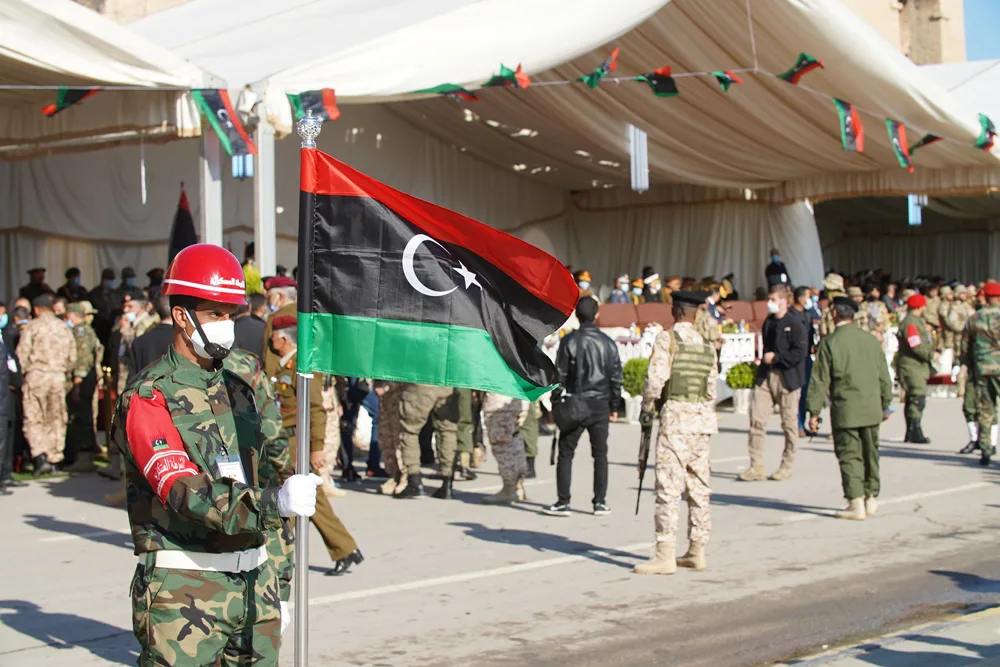
Tripoli, Libya – December 24, 2020: A soldier holds a Libyan flag in Martyrs Square at the celebration the 69th Anniversary of Libyan Independence/ussein Eddeb/Shutterstock
Besides the ongoing armed conflict, crime is also a concern in Libya. In its travel advisory, the United States government warns citizens about high levels of crime, especially kidnapping for ransom.
The power vacuum that enveloped Libya for the past decade has created the perfect conditions for crime to flourish. Since the Libyan government has not been unified for years, then it’s too much to expect the government to be able to collect accurate crime statistics.
The statistics that are available to us point an unpleasant image. In 2022, Libya scored a 60.2 out of 100 on the crime index, meaning that crime levels are very high.
Actual crime levels are probably much higher since it’s difficult to gather information about parts of Libya that are under control of rival armed groups. The high rate of violent crime drives up Libya’s overall crime rate.
Individuals and organized criminal groups carry out violent crimes such as kidnapping, banditry, carjacking, and even homicide without a second thought. Due to the weak nature of the Libyan state, they are rarely persecuted.
Many armed militias in Libya double as organized crime syndicates. According to the Global Organized Crime Index, Libya scores a 6.55 score on the criminality index and is the worst in North Africa in terms of organized crime.
Human trafficking is particularly prevalent, often affecting migrants from elsewhere who attempt to cross to Europe through Libya.
Organized crime groups are involved in other illegal activities such as the arms trade, oil smuggling, and the drug trade. These crimes do not directly affect tourists but contribute to an environment where personal safety is not valued.
Finally, some serious crimes have occurred on the territory of Libya over the past few years. The United Nations published a report that said there is reasonable doubt that Libya was the site of crimes against humanity, some of which are still ongoing.
These include violence in prisons, war crimes, and abuse of migrants. Even if tourists from Western countries are unlikely to be targeted, it is very easy to get caught in the crossfire.
Petty crime is also prevalent in Libya, but there are so many more serious offenses that it seems almost silly to discuss it. Plus, accurate statistics about the prevalence of pickpockets are nearly impossible to find.
Terrorism
Ever since the fall of Gaddafi, terrorist groups have taken advantage of the power vacuum. The most prominent incident was probably the storming of the US embassy in Benghazi and the murder of four Americans in 2012, but the violence certainly did not stop there.
Many different terrorist groups operate in Libya, including Daesh (ISIS) and its affiliates, Al-Qaeda, and other more local groups.
The UK government emphasizes the threat of Daesh in its travel advisory for Libya as the terrorist group has carried out several deadly attacks over the past few years.
Different warring factions will sometimes ally with terrorist groups or support them under the table as part of getting control. The Canadian government lists frequent targets for terrorist groups, including government buildings, military checkpoints, and security force training centers.
Places frequented by foreigners are also targeted such as hotels, tourist areas, and any remaining embassies. Foreign individuals are also sometimes targeted.
Libyan terrorists frequently use improvised bombs, grenades, and other weapons to attack their targets. Due to the prevalence of the illegal arms trade in Libya, it’s very easy for an unsavory group to get their hands on weapons they need to do serious damage.
There is no way to completely avoid being the victim of a terrorist attack in Libya since they are sadly so common — except not going to Libya.
Kidnapping
Besides terrorism, there are many other crimes that flourish in Libya’s lawless environment. One of the most common ones that affects foreigners is kidnapping.
The New Zealand government warns that foreigners are at high risk of kidnapping by terrorist groups, armed militias, or ordinary criminals, who know they can try and extort high ransoms for Western travelers.
The UK government goes into more detail about this crime, especially when it is perpetrated by terrorist groups. Kidnapping is a common terrorist tactic by groups such as Al-Qaeda.
These groups either directly kidnap individuals or purchase hostages from criminal groups that carry out their dirty work. Then, the groups can ransom their captives.
There have also been situations where terrorist groups killed foreign captives to send a message. The US government also warns about detention by the authorities in any given part of Libya.
The different militias vying for control over Libya and the semi-official government all have a history of arbitrarily detaining foreigners. Foreign citizens are usually kept in poor conditions and denied basic rights, such as the right to a lawyer.
Avoiding Bad Areas
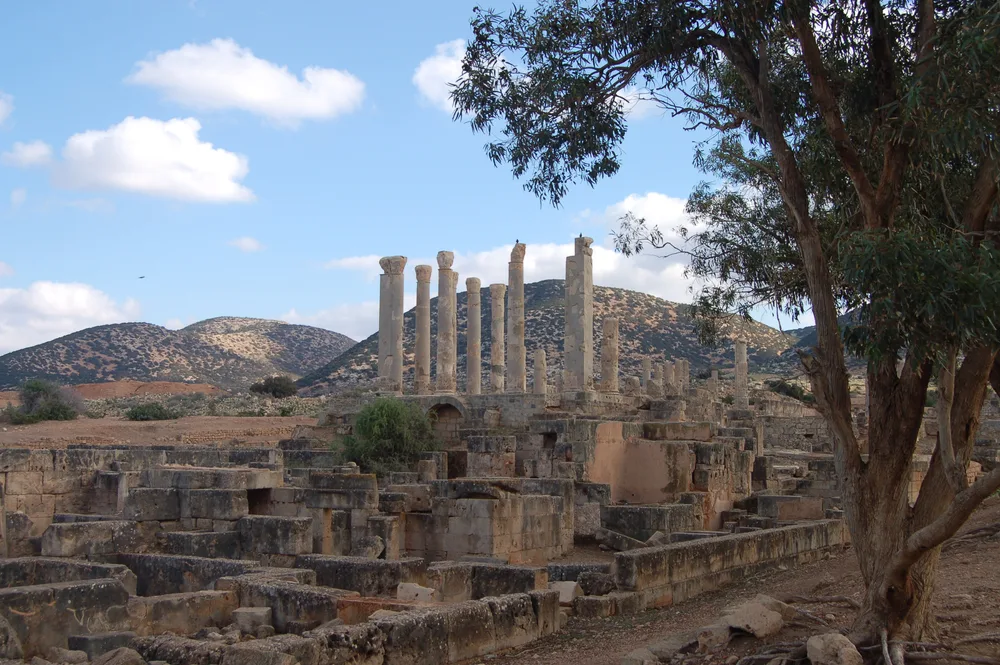
Claudiovidri/Shutterstock
It’s hard to single out any particularly bad areas of Libya when the entire country has such a volatile security situation. Avoid most of Libya’s land borders, especially the southern land borders with Algeria, Niger, Chad, and Sudan.
Terrorist groups that carry out kidnappings are more powerful around here. The city of Benghazi is a bit of a hotspot for terrorist activity, so avoid going there if possible.
The coastal road west of Tripoli, especially the stretch connecting Tripoli and Zawiyah, is dangerous. The road attracts criminal groups that carry out kidnappings, carjackings, and bandit attacks, plus it has a lot of unexploded ordinances.
Things to Consider
Here are some other things to keep in mind when you try to think about visiting Libya:
- Visiting Libya is illegal unless you have a business visa, which you can only get with a formal letter of invitation from a local company.
- Using any illegal substances, including alcohol, is illegal in Libya and the penalties are very severe.
- Libya attracts some adventure tourists, and they report that it is impossible to travel in the country without a guide and a local official providing security. Even this entourage is not a guarantee of safety.
- Certain areas still have landmines and unexploded ordinances. Ask if the places you will be visiting in Libya have this problem and try to stick to well-trodden paths wherever you go just in case.
Frequently Asked Questions
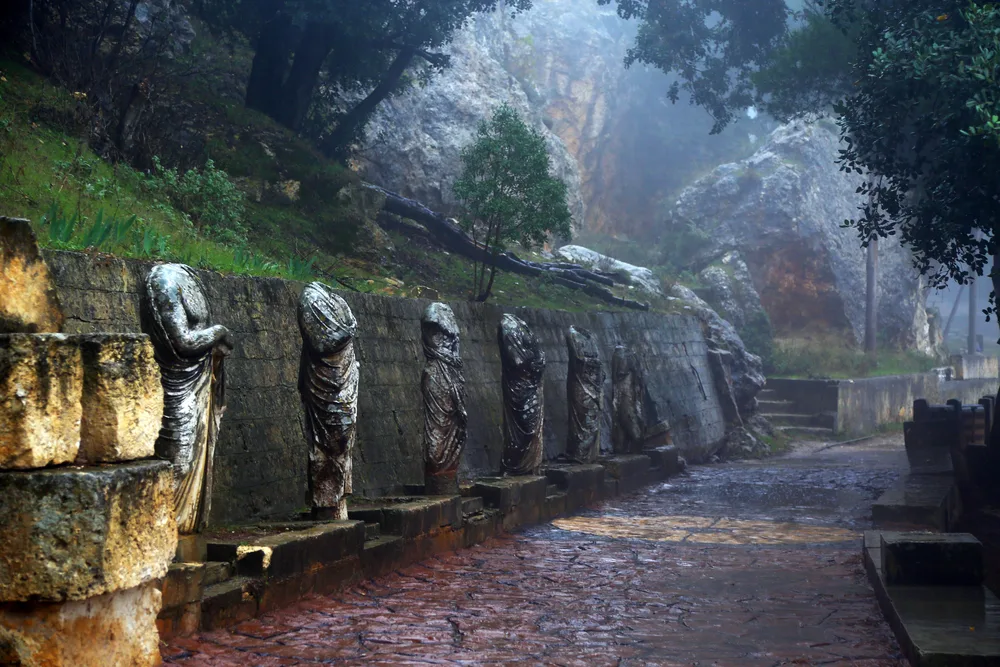
Mahir Alawami/Shutterstock
Here are some common questions you might still want to ask about Libya:
Is Libya friendly to the US?
It’s difficult to answer if Libya is friendly to the US since there isn’t even a unified Libyan government. While the Government of National Accord has good relations with the US and relies on its support, other factions in Libya are unfriendly to American interests, especially former supporters of Gaddafi.
Why is there so little tourism in Libya?
Libya has so little tourism now because of the volatile nature of its security situation. The tourism industry was never well-developed, even though it has a lot of potentially interesting sights, because the government did not invest into it and the political situation did not make Libya an attractive destination.
Can I travel to Libya by land?
Libya has two land borders still open, the one with Tunisia in the west and with Egypt in the east. However, the roads to both of these border crossings are dangerous, so it’s better to fly.
Is Libya a good place to live?
Libya is not a good place to live due to the volatile security situation and poor economic prospects. Plus, many migrants are treated very poorly there, especially those from sub-Saharan countries.
Is Libya still at war?
Both rival governments technically signed a permanent ceasefire in 2020. However, several years have passed and clashes are still present and there is no power-sharing agreement.
So, Is Libya Safe to Visit?
You should probably wait to visit Libya until the security situation calms down, which unfortunately looks like it will not happen any time soon. Libya has been suffering from a civil war for over a decade, and before that was under the rule of a dictator.
The result is a country with competing rival factions, arbitrary violence that doesn’t abide by any ceasefires, and the perfect atmosphere for crime.
Foreigners are often targeted by criminal actors, including terrorist groups, and no attraction in Libya is worth the risk to your life. But fortunately for you, there are countless other locations in the world that are safe. Check them out today!



